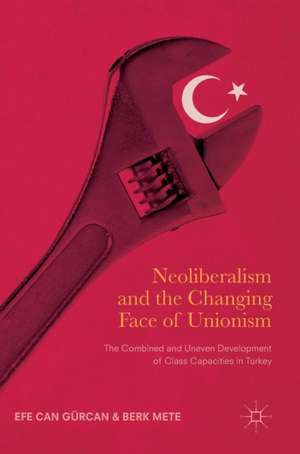Neoliberalism and the Changing Face of Unionism: The Combined and Uneven Development of Class Capacities in Turkey
Autor Efe Can Gürcan, Berk Meteen Limba Engleză Hardback – 30 ian 2017
| Toate formatele și edițiile | Preț | Express |
|---|---|---|
| Paperback (1) | 576.89 lei 6-8 săpt. | |
| Springer International Publishing – 20 iul 2018 | 576.89 lei 6-8 săpt. | |
| Hardback (1) | 581.14 lei 6-8 săpt. | |
| Springer International Publishing – 30 ian 2017 | 581.14 lei 6-8 săpt. |
Preț: 581.14 lei
Preț vechi: 683.70 lei
-15% Nou
Puncte Express: 872
Preț estimativ în valută:
111.24€ • 116.86$ • 93.48£
111.24€ • 116.86$ • 93.48£
Carte tipărită la comandă
Livrare economică 12-26 martie
Preluare comenzi: 021 569.72.76
Specificații
ISBN-13: 9783319482835
ISBN-10: 3319482831
Pagini: 164
Ilustrații: XIII, 164 p. 12 illus., 10 illus. in color.
Dimensiuni: 148 x 210 x 15 mm
Greutate: 0.34 kg
Ediția:1st ed. 2017
Editura: Springer International Publishing
Colecția Palgrave Macmillan
Locul publicării:Cham, Switzerland
ISBN-10: 3319482831
Pagini: 164
Ilustrații: XIII, 164 p. 12 illus., 10 illus. in color.
Dimensiuni: 148 x 210 x 15 mm
Greutate: 0.34 kg
Ediția:1st ed. 2017
Editura: Springer International Publishing
Colecția Palgrave Macmillan
Locul publicării:Cham, Switzerland
Cuprins
1. The Increasing Relevance of the Working Class: Global Movements and the Case of Turkey.- 2. The Combined and Uneven Development of Class Capacities in Pre-Neoliberal Turkey.- 3. Turkey’s Neoliberal Restructuring and Class Capacities: A Macro-Level Assessment from a Combined and Uneven Development Perspective.- 4. A Bottom-Up Approach to the Combined Development of Working Class Capacities in Turkey: Privatization, Flexibilization, and Union Responses.- 5. The Uneven Development of Working Class Capacities in Turkey: Clientelism, Paternalism, and Politics of Identity.- 6. Turkey’s Social Unionism from a Combined and Uneven Development Approach: Labour Flexibility and Working Class Identities.- 7. Conclusion.
Notă biografică
Efe Can Gürcan is an instructor of Sociology and a PhD candidate in Sociology at Simon Fraser University, Canada. He has published over a dozen articles and book chapters on political economy, international development, and social movements.
Berk Mete is pursuing an MSc in Sociology at Maltepe University, Turkey. His thesis concerns workers' autonomy at Kazova, a recuperated textile factory in Turkey.
Textul de pe ultima copertă
This book provides a political, economic, and sociological investigation of how neoliberalism shapes ‘working class capacities,’ or the power of the working class to organize and struggle for its collective interests. Efe Can Gürcan and Berk Mete discuss the global importance of the labor question as it pertains to Turkey. They apply the main theoretical framework of the combined and uneven development of class capacities to Turkish trade unionism. They also address Turkey’s recent history of neoliberalization and its repercussions for class capacities, as mediated by national regulations, conservative unionism, and Islamic social assistance networks. Finally, the authors explore how neoliberalism generates intra-class fragmentation through public regulatory mechanisms and cultural differentiation in the sphere of social unionism.
Caracteristici
Situates the question of Turkish unionism within a rich sociological framework Provides systematic and comprehensive coverage of Turkish trade unionism in the neoliberal era Offers a unique perspective on Turkish trade unions and their relationship to Turkish capitalism
